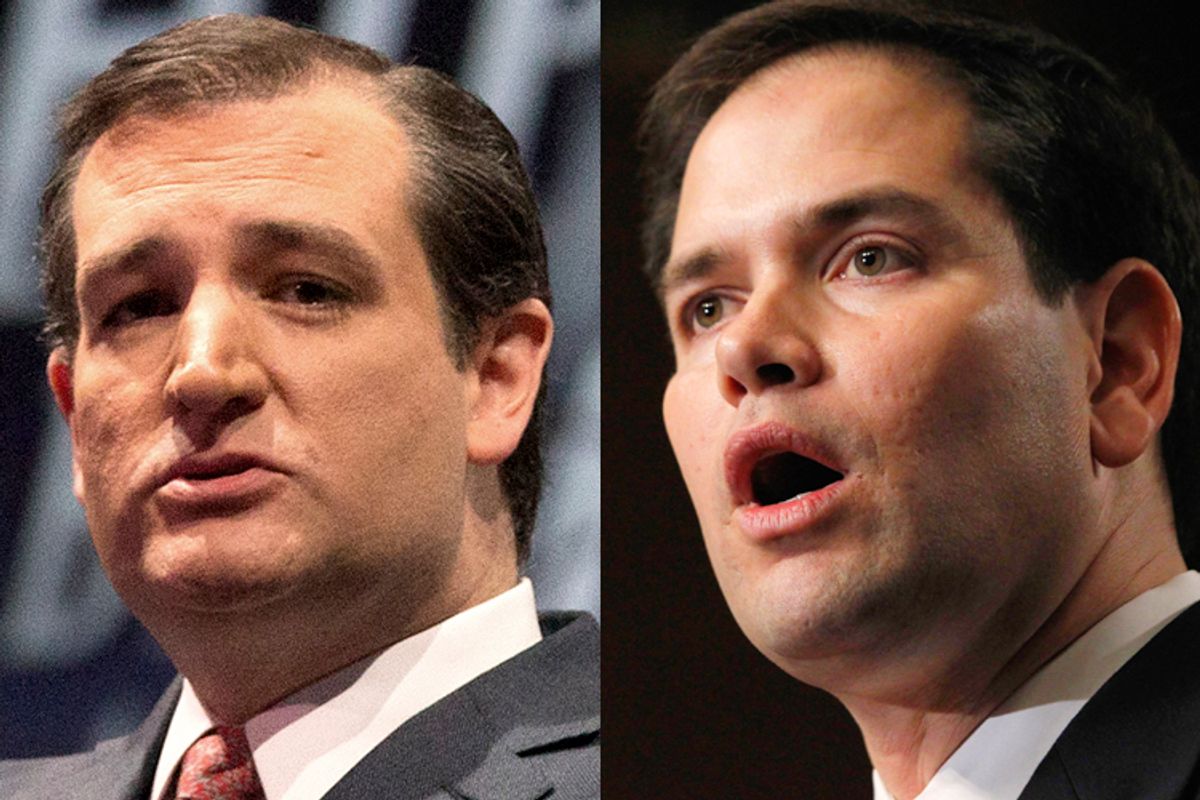On “Meet the Press” this past Sunday, Marco Rubio made clear that he, as president, would see to it that gay Americans would lose their newly won constitutional right to marriage. Asked by Chuck Todd on whether he would accept equal marriage rights for gay couples as a permanent fixture of American law, Rubio said no. “I don’t believe any case law is settled law,” he said. “Any future Supreme Court can change it. And ultimately, I will appoint Supreme Court justices that will interpret the Constitution as originally constructed.” So Marco Rubio, self-described candidate of the future, will roll back the advance of individual rights because that’s what our long-dead founders would have wanted, probably.
This fits into a larger pattern of increasingly direct appeals to Christian conservatives and evangelicals by Rubio. Late last month he went on the Christian Broadcast Network and, when asked about same-sex marriage, began talking up the superiority of God’s rule over civil authorities. And now Rubio has a brand new ad out aimed at people with “traditional values” who “feel out of place in our own country.”
What you’re seeing here is the Rubio response to Ted Cruz’s surge in national and Iowa polling. Just like Rubio’s ridiculously hawkish posturing goaded Cruz into taking a more aggressive stance on national security, Cruz’s success with Christian conservatives is forcing Rubio to pander harder to the religious right. He’s stoking the resentments of people who feel that the expansion of gay rights represents an abrogation of their own religious liberty. He’s still not as far to the right as Cruz, whose reaction to the Supreme Court’s legalization of gay marriage was to argue that states are not bound by the decision, but it’s pretty clear that Rubio is looking to bite into his rival’s base of support.
It’s a bit much, though, for Rubio to stare solemnly into the camera lens and commiserate with his fellow Christians about “feel[ing] out of place in our own country.” I get that Christian conservatives have grievances when it comes to government recognition of same-sex marriage rights, but this is defining alienation down. The number of self-identified Christians in the U.S. may be declining, but they still represent a robust 70 percent of the country. And despite that commanding presence, Christians are still wildly overrepresented in government. Being a Christian in America means being part of a comfortable, empowered majority. Your interests, broadly speaking, are looked out for.
However, while Rubio is complaining that Christians feel like outsiders in their own nation, he’s also defiantly insisting that there’s no evidence of any sort of broad discrimination against Muslim Americans in the U.S. That flies in the face of what we’ve seen in the aftermath of the Paris and San Bernardino terrorist attacks, with strident anti-Muslim rhetoric coming from leading politicians, and threats and acts of violence aimed at Muslim Americans. A 2010 Gallup poll found that 48 percent of Muslims in America had experienced some sort of racial or religious discrimination – far more than any other religious group surveyed. While hate crimes in general are on the decline, hate crimes against Muslims are on the rise. The discrimination is real, but Rubio refuses to even acknowledge it, which is itself an expression of that discrimination.
But sympathy for the rights of gay couples or the injustices Muslims face won’t help him to hold off the Cruz insurgency. Instead he’s ignoring anti-Muslim discrimination and promising to strip gays of their rights so he can make inroads with narrow slices of an entitled majority that very much want to believe they are outsiders in their own land.


Shares